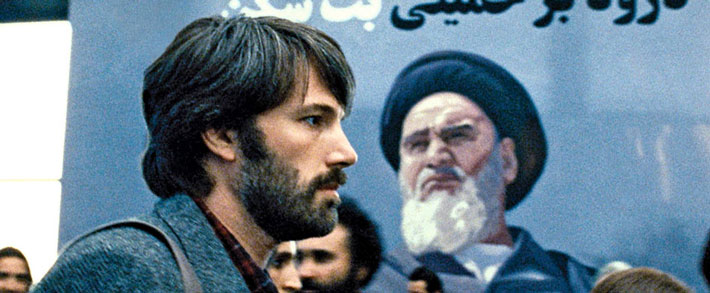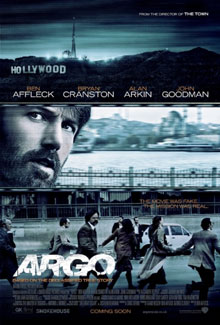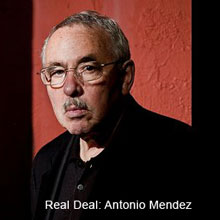Hispanics net few roles in major Hollywood movies, explosive study on diversity in movies finds.
http://nydn.us/WWnidc
ARGO: Does American Mean Being White?
 Miguel Picker & Chyng Sun
Miguel Picker & Chyng Sun
THE POLITICAL THRILLER ARGO, WINNING THE GOLDEN GLOBES FOR BEST PICTURE AND DIRECTOR AND NOMINATED FOR SEVEN ACADEMY AWARDS, HAS STIRRED CONTROVERSY AMONG LATINO COMMUNITIES.

The political thriller ARGO, recently nominated for seven Academy Awards nominations and five Golden Globe Awards, has stirred controversy among Latino communities. The film is loosely based on the stranger-than-fiction account of Antonio Mendez, a CIA operative who led the rescue of six U.S. diplomats from Tehran during the 1979 Iran hostage crisis. Ben Affleck not only directed the film, but also plays Mendez.
The decision to cast Affleck, a white non-Latino man, to play Mendez (a Mexican American with family roots in Nevada dating back six generations) received no mention in mainstream movie reviews, such as those in the New York Times and the New Yorker, but it angered many in the Latino community. Legendary filmmaker and activist Moctesuma Esparza accused Affleck of “white-washing” Mendez’s identity in the film in various ways. For example, Mendez’s last name is mentioned only once in the entire film. Moreover, when introducing the “real” Mendez at the end of the film, the filmmakers chose a single long shot of a photo in which his features are indistinct, while headshots of the other “real” historical figures are prominently displayed to demonstrate the close resemblance between them and the actors who played them.
According to María Nieto’s report, Ben Affleck defended his choice to portray Mendez by pointing out that “Tony (Mendez) does not have a Latin/Spanish accent and you wouldn’t necessarily select him out of a line of ten people and go ‘This guy’s Latino.’” As politically progressive as Affleck is, he nonetheless evoked and reinforced one of the worst stereotypes of a “typical” Latino as being a “foreigner,” “other,” and thus not “American.” Chris Terrio, who wrote the screenplay, was amazed at how “American” Mendez is: “You hear the name Mendez and you think New American… at least I do living in New York. But, in fact, Tony has American creds that go much deeper into American history than I do.” Terrio’s justification that Mendez is “American” and thus can be played by a white man neglects the fact that Latino is an ethnicity and runs the full gamut of colors (thus, white Latinos are still Latinos). Terrio also implies a form of white privilege: American is by default white, so if one is “legitimate” American and does not deviate much physically from white, then one can be portrayed by a white actor.
In an ideal world, white actors should be able to play Latino roles. After all, what sets actors apart is precisely their ability to play someone they are not. But we do not live in an ideal world. The reality is that Latinos almost never have the opportunity to play white characters, especially white historical figures, but “brown face” (whites playing Latinos) is still rampant, even in this day and age when “black face” (the practice of casting white actors to play African Americans) is considered unacceptable. Today, one in six adults and one in four children in the United States are Latino, but their reality is rarely depicted in the mainstream media. Only 1% of news coverage and 6% of TV and film characters are about Latinos, and they are depicted overwhelmingly as gangsters, drug dealers, prostitutes, “hoochie mamas,” and welfare-leeching “illegals.” Further, Latinos are largely denied the opportunity to tell their own stories: 1% of directors hired by Hollywood studios are Latinos—in a city in which over 50% of the population is Latino!
Given this long and unjust history of Latinos being grossly underrepresented and misrepresented by the media, Latino communities object to Argo’s casting: when finally a Latino’s story is put on the big screen, it can’t even be portrayed by a Latino. Our objection is also rooted in the urgency we feel after seeing first-hand the effects of media on Latino children.
We interviewed a group of Latino children (between the ages of six and eleven) and asked what Latino roles they remembered seeing in films or television. With the exception of one child who mentioned the questionable cartoon Speedy Gonzales, none of them could name any. We then asked if they had the chance to make a movie, would they like to make a Latino the hero? A nine-year-old boy said no, because “I can’t imagine a Latino person being a main character because in a lot of the movies I watch, usually all the main characters are Americans.”

